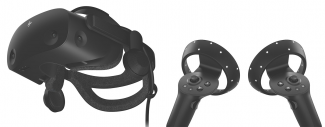HP’s Reverb G2 is seeing steep discounts as rumors circulate production will end next year.
Reverb G2 leverages Microsoft’s ‘Windows Mixed Reality’ PC VR platform. Despite the name, all PC WMR headsets are VR-only, and they’re compatible with most SteamVR content. The Microsoft store has only a handful of VR games and apps, and Microsoft published even its own PC VR content on Steam. But statements from Microsoft and HP don’t give strength to the idea it has much of a future.
”The work of our HP Extended Reality (XR) team has led to exciting innovation as we continue to create more immersive experiences,” HP told UploadVR. “Our customers are at the center of our strategy, and we will continue to evolve our offerings to best meet their needs. Our work in the XR market provides a strong foundation from which to build.”
This came in response to questioning whether HP ended Reverb G2 production and whether the company is still interested in VR. We also asked Microsoft if existing customers can expect support for the platform going forward.
“Microsoft supports a variety of devices with Windows Mixed Reality, including the HP Reverb G2,” Microsoft told UploadVR. “This platform was designed to deliver an experience customers will love, with support for popular titles coming through SteamVR, while enabling the broadest device ecosystem in order to delight our customers.”
A reddit user of 6 years claimed a HP representative told them HP will end Reverb G2 production next year & exit the VR market. We usually wouldn’t report on rumors of this kind, but circumstantial evidence suggested it might have some truth to it, and that’s why we reached out to the companies for context.
Neither statement sheds much light on our core questions and the past tense “was” led us to ask for clarification, with Microsoft saying WMR is still in “active” development — but precisely what that means remains to be seen.
Other Windows MR headsets were sold for as low as $200 at times, but all failed to reach widespread adoption. The Steam Hardware Survey shows just 5% of SteamVR users in September were using any kind of Windows MR headset, compared to 64% using Meta headsets and 17% using the Valve Index.
We reviewed Reverb G2 when it first launched. We loved the comfort, audio, and clarity of the headset – but found the controller tracking and ergonomics lacking. It’s an ideal headset for simulators, but for room-scale gaming it doesn’t quite match up to Quest 2 or Valve Index.

The ability of Meta’s Quest 2 to function in either standalone mode or PC VR mode has made it the headset of choice for most buyers since it launched, despite being less comfortable than Reverb G2 and having lower resolution.
HP’s former Global Head of Virtual Reality for the launch of Reverb and Reverb G2 Joanna Popper left the company earlier in the year. Popper was the public face of HP’s VR efforts, and we haven’t seen any other HP higher-up publicly advocate for VR in recent months.
HP also sells a $1,250 Reverb G2 Omnicept model to businesses which includes face tracking & eye tracking. But those features are now available in Meta’s Quest Pro, as an add-on to HTC’s Vive Focus 3, and in the upcoming Pico 4 Enterprise – and these headsets are wireless & standalone too, with regular software updates to improve their functionality.
VR hardware is becoming a competitive market. HP relied on Microsoft as its software partner, but Microsoft hasn’t updated WMR significantly in several years seems and is instead partnering with Meta to bring Windows & Office to Quest.
Just before Meta Connect last week HP heavily discounted Reverb G2 from $600 to $350 in the US. Was this just a timely offer, or a fire sale?





